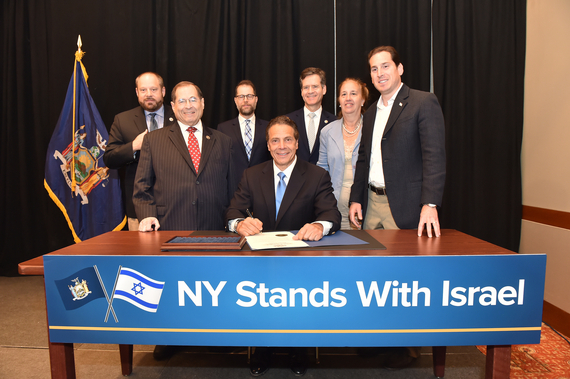On Sunday, Governor Andrew Cuomo of New York signed an Executive Order that would prevent New York state funds from going to institutions or companies that support the global nonviolent "Boycott, Divestment and Sanctions" (BDS) movement.
By signing an Executive Order preventing state funds from being allocated to institutions that support BDS, New York is suppressing freedom of speech, expression, and association. On Sunday, Governor Cuomo prioritized the economic interests of a foreign ally over our Constitution's First Amendment.
Numerous perspectives have been offered on this form of nonviolent advocacy -- stirring a national conversation and debate on the merits, motivations and effectiveness of BDS.
However, the debate over the BDS movement and what it stands for is arguably irrelevant when debating anti-BDS laws. The First Amendment allows individuals to protest Chick-Fil-A for its position on marriage equality. It protects individuals from boycotting Hobby Lobby for its position on women's health issues. It allows the Westboro Baptist Church to picket at veterans' funerals -- with hateful and painful language and imagery -- just as it protects counter-protesters from lining the funeral procession route with American flags as a show of support for veterans.
There are two primary arguments that demonstrate why Governor Cuomo's Executive Order is likely unconstitutional.
First, political speech is among the highest forms of First Amendment protected speech. Political boycotts, or boycotts that seek to bring about political, social or economic change, are considered political speech by the Supreme Court, and thus are protected under the First Amendment. In the 1982 decision in NAACP v. Claiborne Hardware Co., the Court held:
While States have broad power to regulate economic activity, we do not find a comparable right to prohibit peaceful political activity such as that found in the boycott in this case. This Court has recognized that expression on public issues "has always rested on the highest rung of the hierarchy of First Amendment values." Carey v. Brown, 447 U. S. 455, 447 U. S. 467.
Second, the government cannot impose a condition on receiving a government benefit that would deprive an individual of a constitutional right unless a substantial and legitimate government interest exists. In this case, the benefit is state funding. As for the government interest, I have faith that the United States judiciary would not find supporting a foreign government's economic interest significant enough to limit one of the most sacred rights in American democracy -- the rights of its citizens to participate in political speech and expression.
Freedom of speech is not simply for ideas we agree with. The First Amendment was espoused for the very purpose that it was challenged on Sunday -- to prevent the government from suppressing speech it disagrees with.
BDS and attempts to suppress it will remain a hot topic across state legislatures in the 2016 election. Yet I posit that if you disagree with someone's political views, speech, expressive conduct, boycott, etc. the answer is never suppression -- It is always to increase speech. To support a free flowing marketplace of ideas.
The United States thrives or fails depending on the equal protection of the law and how we uphold the values and rights espoused in the Constitution.
On Sunday, we failed. We must work to ensure that it doesn't happen again.

